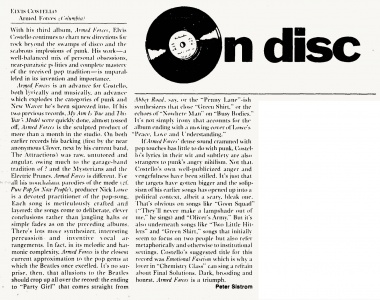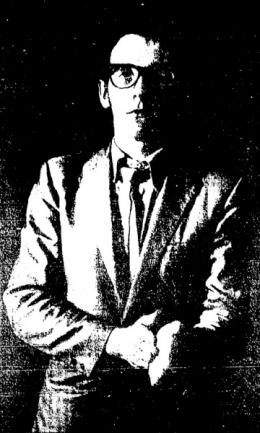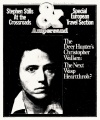Ampersand, March 1979: Difference between revisions
(start page) |
(+browser +tags) |
||
| (3 intermediate revisions by the same user not shown) | |||
| Line 10: | Line 10: | ||
---- | ---- | ||
{{Bibliography text}} | {{Bibliography text}} | ||
With his third album, ''Armed Forces'', Elvis Costello continues to chart new directions for rock beyond the swamps of disco and the scabrous implosions of punk. His work — a well-balanced mix of personal obsessions, near-paranoic politics and complete mastery of the perceived pop tradition — is unparalleled in its invention and importance. | |||
''Armed Forces'' is an advance for Costello, both lyrically and musically, an advance which explodes the categories of punk and New Waver he's been squeezed into. If his two previous records, ''My Aim Is True'' and ''This Year's Model'' were quickly done, almost tossed off, ''Armed Forces'' is the sculpted product of more than a month in the studio. On both earlier records his backing (first by the near anonymous Clover, next by his current hand, The Attractions) was raw, untutored and angular, owing much to the garage-band tradition of Question Mark & the Mysterians and the Electric Prunes. ''Armed Forces'' is different. For all his nonchalant parodies of the mode (cf. ''Pure Pop for Now People''), producer Nick Lowe is a devoted practitioner of the pop-song. Each song is meticulously crafted and layered: the songs come to deliberate, clever conclusions rather than jangling halts or simple fades as on the preceding albums. There's lots more synthesizer, interesting percussion and inventive vocal arrangements. In fact, in its melodic and harmonic complexity, ''Armed Forces'' is the closest current approximation to the pop gems at which the Beatles once excelled. It's no surprise, then, that allusions to the Beatles should crop up all over the record: the ending to "Party Girl" that comes straight from ''Abbey Road'', say, or the "Penny Lane"-ish synthesizers that close "Green Shirt," or the echoes of "Nowhere Man" on "Busy Bodies." It's not simply irony that accounts for the album's ending with a moving cover of Lowe's "Peace, Love And Understanding." | |||
If ''Armed Forces''' dense sound crammed with pop touches has little to do with punk, Costello's lyrics in their wit and subtlety are also strangers to punk's angry nihilism. Not that Costello's own well-<wbr>publicized anger and vengefulness have been stilled. It's just that the targets have gotten bigger and the solipsism of his earlier songs has opened up into a political context, albeit a scary, bleak one. That's obvious on songs like "Goon Squad" (''"They'll never make a lampshade out of me."'' he sings) and "Oliver's Army." But it's also underneath songs like "Two Little Hitlers" and "Green Shirt," songs that initially seem to focus on two people but also refer metaphorically and otherwise to institutional settings. Costello's suggested title for this record was ''Emotional Fascism'' which is why a lover in "Chemistry Class" can sing a refrain about Final Solutions. Dark, brooding and honest. ''Armed Forces'' is a triumph. | |||
{{cx}} | |||
{{tags}}[[Armed Forces]] {{-}} [[My Aim Is True]] {{-}} [[This Year's Model]] {{-}} [[Clover]] {{-}} [[The Attractions]] {{-}} [[Question Mark & the Mysterians]] {{-}} [[Pure Pop For Now People]] {{-}} [[Nick Lowe]] {{-}} [[The Beatles]] {{-}} [[Party Girl]] {{-}} [[Penny Lane]] {{-}} [[Green Shirt]] {{-}} [[Busy Bodies]] {{-}} [[(What's So Funny 'Bout) Peace, Love And Understanding?]] {{-}} [[Goon Squad]] {{-}} [[Oliver's Army]] {{-}} [[Two Little Hitlers]] {{-}} [[Green Shirt]] {{-}} [[Emotional Fascism]] {{-}} [[Chemistry Class]] | |||
{{cx}} | {{cx}} | ||
| Line 18: | Line 24: | ||
{{Bibliography notes}} | {{Bibliography notes}} | ||
{{Bibliography next | |||
|prev = :Category:Ampersand | |||
|next = Ampersand, April 1979 | |||
}} | |||
'''Ampersand, March 1979 | '''Ampersand, March 1979 | ||
---- | ---- | ||
| Line 24: | Line 34: | ||
{{Bibliography images}} | {{Bibliography images}} | ||
[[image:1979-03-00 Ampersand page 20 clipping 01.jpg| | [[image:1979-03-00 Ampersand page 20 clipping 01.jpg|380px]] | ||
<br><small>Clipping.</small> | <br><small>Clipping.</small> | ||
<small>Photo.</small><br> | |||
[[image:1979-03-00 Ampersand photo 01.jpg|260px|border]] | |||
<small>Cover and page scan.</small><br> | |||
[[image:1979-03-00 Ampersand cover.jpg|x120px|border]] | [[image:1979-03-00 Ampersand cover.jpg|x120px|border]] | ||
[[image:1979-03-00 Ampersand page 20.jpg|x120px|border]] | [[image:1979-03-00 Ampersand page 20.jpg|x120px|border]] | ||
{{Bibliography notes footer}} | {{Bibliography notes footer}} | ||
Latest revision as of 17:24, 8 February 2022
|



